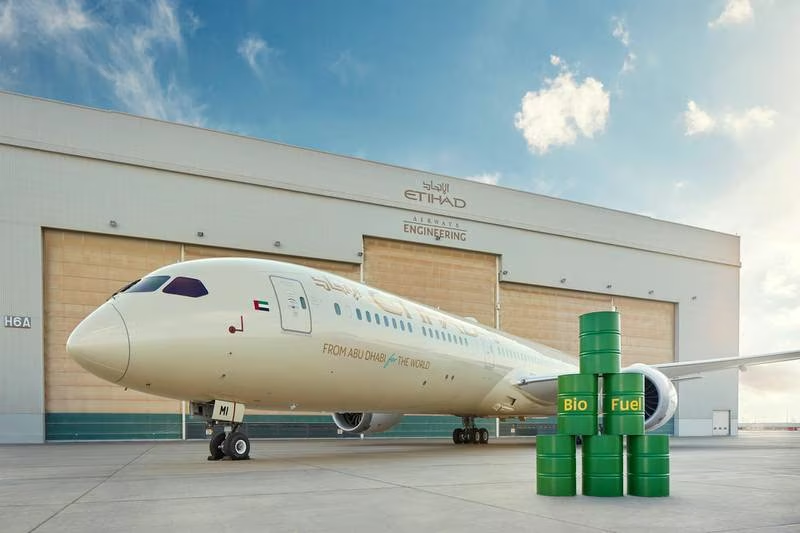In Short : Chicago-based United Airlines Holdings Inc., like the rest of the aviation industry, is grappling with its enormous climate impact. United expects to burn more than 4 billion gallons of jet fuel this year, which will spout about 40 million tons of carbon dioxide into the atmosphere—more than double the pollution of all the cars in the company’s home state of Illinois.
In Detail : United Airlines presents itself as the unrivaled leader in cleaner jet fuel. A recent ad campaign featuring the garbage-can-dwelling Oscar the Grouch as the airline’s new “chief trash officer” publicizes its commitment to turn banana peels and old socks into less-polluting jet fuel. In another ad, the company says it’s “investing in more sustainable aviation fuel production than any other airline in the world.”
Chicago-based United Airlines Holdings Inc., like the rest of the aviation industry, is grappling with its enormous climate impact. United expects to burn more than 4 billion gallons of jet fuel this year, which will spout about 40 million tons of carbon dioxide into the atmosphere—more than double the pollution of all the cars in the company’s home state of Illinois.
Global aviation generates 2.5% of man-made CO2, and it’s one of the industries that can’t be rapidly electrified. As the planet-warming pollution from driving vehicles and running power plants declines, the carbon toll of flying is only expected to rise. By 2050 aviation could exceed 20% of humanity’s total carbon footprint.
That’s why airlines have focused on slashing emissions by dramatically increasing the use of sustainable aviation fuel, or SAF, made from things such as used cooking oil, animal fat and agriculture waste. Planes powered by these petroleum alternatives release far fewer heat-trapping emissions than those using fossil fuel.
Only a half-dozen companies make commercial quantities of SAF, which accounts for about 0.1% of the world’s jet-fuel supply and costs at least twice as much to produce. Almost every major airline has pledged to use at least 10% sustainable jet fuel by 2030. For most, including United, this would amount to a hundredfold increase in only seven years.
United has publicly embraced the enormity of the challenge. In an interview, Chief Executive Officer Scott Kirby sounds almost like an environmental activist at times, describing himself as an “admitted climate change geek going all the way back to college.” He’s concerned that the public still doesn’t fully grasp the looming dangers of our warming planet and says airlines must play a “leading role” to help solve the crisis.
But United’s leadership in sustainable fuels hasn’t matched its rhetoric. United consumed 2.9 million gallons of SAF last year, representing 0.08% of its fuel supply. That puts the company slightly ahead of its US counterparts but far behind several airlines in Europe, which have to prepare to meet new requirements that don’t exist in the US.
Air France-KLM has more than quadrupled United’s total by using 13.9 million gallons of SAF, making it the world leader by volume. That amounted to 0.59% of its fuel consumption, or more than seven times United’s percentage.
The lackluster performance in the US shines a spotlight on starkly different approaches to spurring SAF around the world. European Union rules will require 2% SAF usage by 2025, 20% by 2035, and 70% by 2050. Governments in the UK and Japan have proposed similar rules. Many European airlines, including Air France-KLM, have supported the EU regulatory approach. Australia’s biggest carrier, Qantas Airways Ltd., recently called on the government to introduce its own requirements “to help kick-start local production of SAF.”
United and other US carriers, though, have staunchly opposed any such mandates on their home turf, arguing that the airlines are already voluntarily pursuing sustainable fuels and that requiring their use before adequate supplies exist will cause prices to soar. “We don’t want flying to become a luxury commodity,” says Helen Giles, managing director of environmental sustainability at Southwest Airlines Co.
Regulators in California are considering including jet fuel under the state’s low-carbon fuel standard, which could force airlines to use more SAF or potentially pay penalties. Airlines for America, the trade group representing US airlines, has criticized the idea, warning the state that it’s overstepping its authority. United’s Kirby is the group’s vice chairman.
Instead of mandates, Kirby argues, governments need to pour financial incentives into the space, much the way they did for wind and solar over the past couple of decades. “Today it’s cheaper to produce a megawatt of electricity with wind and solar than it is with fossil fuels,” he says. “I believe the same thing can and will happen in SAF if we invest in it.”

